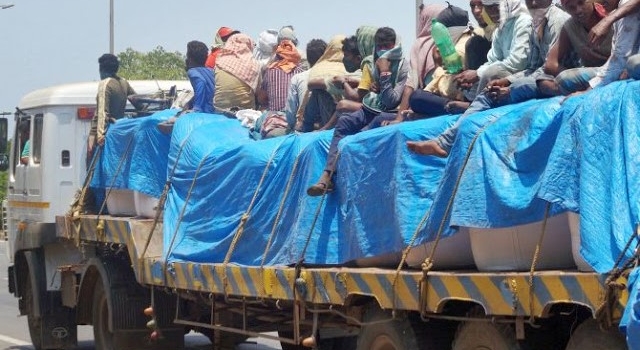“Madam, Jhooth nahi bolenge, 1500 pada hai, hum 75 aadmi ek truck me aae the (Madam, I’ll not lie, we came back in Rs. 1,500 per head, 75 of us packed in one turck),” Ram Kishore confessed to the first writer when she called him up in his village Dalkheda in Unnao District to verify some information related to migrant labourers who’ve returned. Ram Kishore is a Dalit like most workers from his village who had migrated in search of livelihood. Ram Kishore used to work in a crockery factory in Delhi. Ram Sewak, from the same community, used to vend vegetables in Ludhiana. His two sons Shivam and Himanshu used to work in a sticker making factory there and had to return with unpaid salary for the last two months. He called up to say that it has been two months since they returned and there has been no support whatsoever forthcoming from the government. His family is landless and in desperation, he has come to Lucknow now but even here he is finding it difficult to earn a livelihood.
Ganga Ram from village Arsena used to work as a guard in a newspaper office in Noida and his son Amit used to run errands in the same office. He lost Rs. 5,000 is an Automatic Teller Machine and his son returned with Rs. 4,000 pending wages. Seema (not her real name), merely 17 years of age, was working as a domestic help in Noida to support her family. She had to return all by herself.
Listening to all the stories of the migrant workers who have come back made us feel really privileged for all the things we have.
The first writer was a student studying in Germany when lockdown forced her to take one of those repatriation flights and she thought she had to struggle at the airport or wait in long queues, knowing little about the real miseries the less privileged were facing back in India. She got an opportunity to talk to these migrant workers as part of a survey which was conducted. She was inquiring about the cost each of them had to incur to come back.
She stayed at Clarks Awadh hotel for quarantine period, where she was provided meals three times a day but for some of the migrant workers who were quarantined at some school in their vicinity, they had to manage food from their home. Maybe the system is not broken but surely there are many loopholes, some intentional, some unintentional, because of which many returnee migrant workers were denied the benefits which were promised by the Chief Minister Yogi Adityanath and still continue to be neglected. It was not the government but the civil society which restored the faith in humanity by providing food, water and other services to the returning migrant workers. The government appeared to be an obstacle in their passage back home.
A stark disparity in our society has forced some of the less privileged to suffer and continue to suffer. Some of the migrant workers had to walk back and can one sitting in one’s house complaining about the lockdown imagine the sheer helplessness of the migrant workers?
They leave their family to find work in different cities to sustain themselves. Due to lockdown, they were forced out of work. Managing a day’s meal became difficult and on top of that was the pressure of paying rent. “Everybody immediately agreed to the idea of returning as soon as it was suggested because there was no way we could have survived under the conditions of extended lockdown,” as Ram Kishore told his story, not once did it appear that he was complaining, he was just narrating the simple fact.
On the other hand, the privileged class was safe inside their homes and had a comfortable cushion in the form of savings. Most service sector employees continued to get their salaries during the lockdown. They had the luxury to work from home. On a bad day, we often start blaming our lives but talking to the migrant workers and acknowledging their situation has definitely shaped us in a better way, despite all the misery and pressure they are in, they were all very polite and humble, not once did they wail, but to hear them breaks one’s heart a little. It is beyond comprehension how some families managed to walk back on foot with their toddlers and all their belongings packed in one or two bags carried on their backs or heads facing threats on three fronts – the coronavirus disease, hunger and the police.
Sometimes people are not looking for solutions they are looking for someone who is willing to hear them out. Some of the migrant workers we spoke to just wanted to pour their heart out because they felt finally someone is listening to them, like some shared their desperate condition in the village, some of them are tired sitting at home because there is nothing to do. The lockdown regime seems to have choked all their options.
That is where the difference between the privileged and migrant workers seems to end. As the migrant workers face an uncertain future, the first writer is not sure whether she wants to go back to Germany. Her social cushion may help her survive materially but like the migrant worker, her aspirations are dashed for the moment. She may finish her degree formally by completing online classes but getting a job has become a big question mark.
By Shivangini Piplani and Sandeep Pandey
Contact: 9559704624, 0522 2355978
e-mail: piplani.shivi@gmail.com, ashaashram@yahoo.com
Note: Shivangini Piplani is doing her Masters at the Berlin School of Business and Innovation and Sandeep Pandey is a social-political activist.













